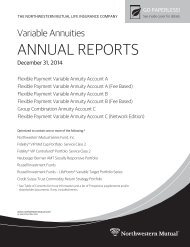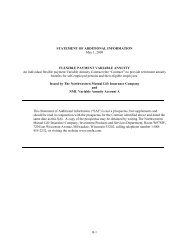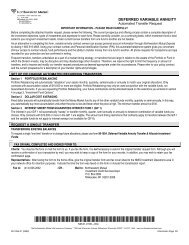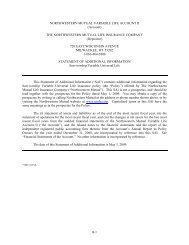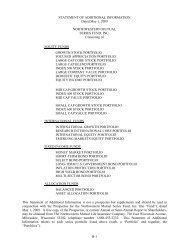B-1 STATEMENT OF ADDITIONAL INFORMATION Dated May 1 ...
B-1 STATEMENT OF ADDITIONAL INFORMATION Dated May 1 ...
B-1 STATEMENT OF ADDITIONAL INFORMATION Dated May 1 ...
You also want an ePaper? Increase the reach of your titles
YUMPU automatically turns print PDFs into web optimized ePapers that Google loves.
proposed for a legitimate business purpose and without the negative effects identified above, theAdviser will vote affirmatively.13. Confidential VotingCompanies that have not previously adopted a "confidential voting" policy allow management toview the results of shareholder votes. This gives management the opportunity to contact thoseshareholders voting against management in an effort to change their votes.Proponents of secret ballots argue that confidential voting enables shareholders to vote on all issueson the basis of merit without pressure from management to influence their decision. Opponents arguethat confidential voting is more expensive and unnecessary; also, holding shares in a nominee namemaintains shareholders' confidentiality. The Adviser believes that the only way to insure anonymityof votes is through confidential voting, and that the benefits of confidential voting outweigh theincremental additional cost of administering a confidential voting system. Therefore, we will vote infavor of any proposal to adopt confidential voting.14. Opting In or Out of State Takeover LawsState takeover laws typically are designed to make it more difficult to acquire a corporationorganized in that state. The Adviser believes that the decision of whether or not to accept or rejectoffers of merger or acquisition should be made by the shareholders, without unreasonably restrictivestate laws that may impose ownership thresholds or waiting periods on potential acquirors.Therefore, the Adviser will vote in favor of opting out of restrictive state takeover laws.C. Other Matters1. Shareholder Proposals Involving Social, Moral or Ethical MattersThe Adviser will generally vote management’s recommendation on issues that primarily involvesocial, moral or ethical matters, such as the MacBride Principles pertaining to operations in NorthernIreland. While the resolution of such issues may have an effect on shareholder value, the preciseeconomic effect of such proposals, and individual shareholder’s preferences regarding such issues isoften unclear. Where this is the case, the Adviser believes it is generally impossible to know how tovote in a manner that would accurately reflect the views of the Adviser’s clients, and therefore willreview management’s assessment of the economic effect of such proposals and rely upon it if webelieve its assessment is not unreasonable.Shareholders may also introduce social, moral or ethical proposals which are the subject of existinglaw or regulation. Examples of such proposals would include a proposal to require disclosure of acompany's contributions to political action committees or a proposal to require a company to adopt anon-smoking workplace policy. The Adviser believes that such proposals are better addressedoutside the corporate arena, and will vote with management’s recommendation; in addition, theAdviser will generally vote against any proposal which would require a company to adopt practicesor procedures which go beyond the requirements of existing, directly applicable law.2. Anti-Greenmail Proposals"Anti-greenmail" proposals generally limit the right of a corporation, without a shareholder vote, topay a premium or buy out a 5% or greater shareholder. Management often argues that they shouldnot be restricted from negotiating a deal to buy out a significant shareholder at a premium if theybelieve it is in the best interest of the company. Institutional shareholders generally believe that allshareholders should be able to vote on such a significant use of corporate assets. The Adviserbelieves that any repurchase by the company at a premium price of a large block of stock should besubject to a shareholder vote. Accordingly, it will vote in favor of anti-greenmail proposals.3. IndemnificationThe Adviser will generally vote in favor of a corporation's proposal to indemnify its officers anddirectors in accordance with applicable state law. Indemnification arrangements are often necessaryin order to attract and retain qualified directors. The adoption of such proposals appears to have littleeffect on share value.4. Non-Stock Incentive PlansManagement may propose a variety of cash-based incentive or bonus plans to stimulate employeeperformance. In general, the cash or other corporate assets required for most incentive plans is notB-142



